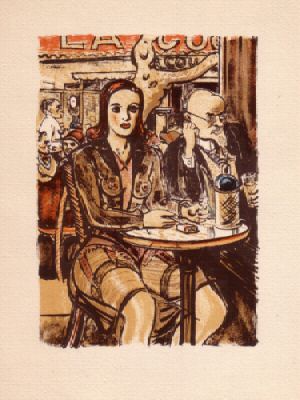Brooks on Books
David Brooks has written a column in the New York Times (It's behind the Times Select Barrier, but these two fine blogs written by serious people have rundowns.) Brooks begins by talking about some research that suggest that girls and boys are different. I know, I know, who would have thunk it. But here's where he throws that David Brooks curve ball: The implication of these differences is that boys shouldn't be forced to read books by or about women because it will force them to hate reading. No word yet on whether girls having been forced to read books almost exclusively by and for men for the last 2000 years has had a negative impact on girls--but that's clearly not important. The simple fact is that men no longer overwhelmingly dominate higher education (though they remain the majority of professors, professionals, and policy makers) so there must be a crisis in the classroom.
But that's not what I want to talk about. I want to talk about a pet peeve of mine that Brooks either buys into or at least pretends to for the "benefit" of his readers. He refers to high school reading lists as full of "feelings and stuff" that turn off boys because of the presence of many female writers. So here goes, though surely not for the last time: more or less all art is about feelings and stuff and other "girly" things. Shakespeare and Tolstoy and, yes, masculinist monomaniac Hemingway all write about feelings. If boys were never asked to develope some sense of empathy with their fellows or with--god forbid!--women, through literature and art, then, well, then the world would be filled with even more douchebags.
There's also a corrollary to this point. Namely that while all art is about feelings, not all art is about the same feelings. This is an individual property, not one sorted by groups. So all female writers do not write about the same things. Just because a lady writes it does not a tear jerker make. I hate Wuthering Heights, it's a silly novel about an absurd melodrama that never invests enough in it's characters to get me to care about them. This, I believe, is because Emily Bronte is not a great writer. Jane Austen's Northanger Abbey is exactly the opposite--it is a brilliant novel. In fact, it's a satire of the sort of novel that Wuthering Heights aspires to be. Oh, and the particular novel that Austen is satirizing, Anne Radcliffe's The Mysteries of Udolpho, is also (I think) pretty good.
The point is that different books are different and you don't know if you'll like them unless you give them a shot. And there is a classroom purpose that is denied when reading lists are tailored to students so that they never have to stretch their perspectives. If boys do worse than girls when they read a diverse array of literature, then maybe the solution is that boys should work on that a little more--if only because that's the exact suggestion people like Brooks give to girls when they do worse on math.
Oh, wait, affirmative action in the classroom is only okay to help boys in A.P. English, everyone else has to many advantages already.
But that's not what I want to talk about. I want to talk about a pet peeve of mine that Brooks either buys into or at least pretends to for the "benefit" of his readers. He refers to high school reading lists as full of "feelings and stuff" that turn off boys because of the presence of many female writers. So here goes, though surely not for the last time: more or less all art is about feelings and stuff and other "girly" things. Shakespeare and Tolstoy and, yes, masculinist monomaniac Hemingway all write about feelings. If boys were never asked to develope some sense of empathy with their fellows or with--god forbid!--women, through literature and art, then, well, then the world would be filled with even more douchebags.
There's also a corrollary to this point. Namely that while all art is about feelings, not all art is about the same feelings. This is an individual property, not one sorted by groups. So all female writers do not write about the same things. Just because a lady writes it does not a tear jerker make. I hate Wuthering Heights, it's a silly novel about an absurd melodrama that never invests enough in it's characters to get me to care about them. This, I believe, is because Emily Bronte is not a great writer. Jane Austen's Northanger Abbey is exactly the opposite--it is a brilliant novel. In fact, it's a satire of the sort of novel that Wuthering Heights aspires to be. Oh, and the particular novel that Austen is satirizing, Anne Radcliffe's The Mysteries of Udolpho, is also (I think) pretty good.
The point is that different books are different and you don't know if you'll like them unless you give them a shot. And there is a classroom purpose that is denied when reading lists are tailored to students so that they never have to stretch their perspectives. If boys do worse than girls when they read a diverse array of literature, then maybe the solution is that boys should work on that a little more--if only because that's the exact suggestion people like Brooks give to girls when they do worse on math.
Oh, wait, affirmative action in the classroom is only okay to help boys in A.P. English, everyone else has to many advantages already.






0 Comments:
Post a Comment
<< Home